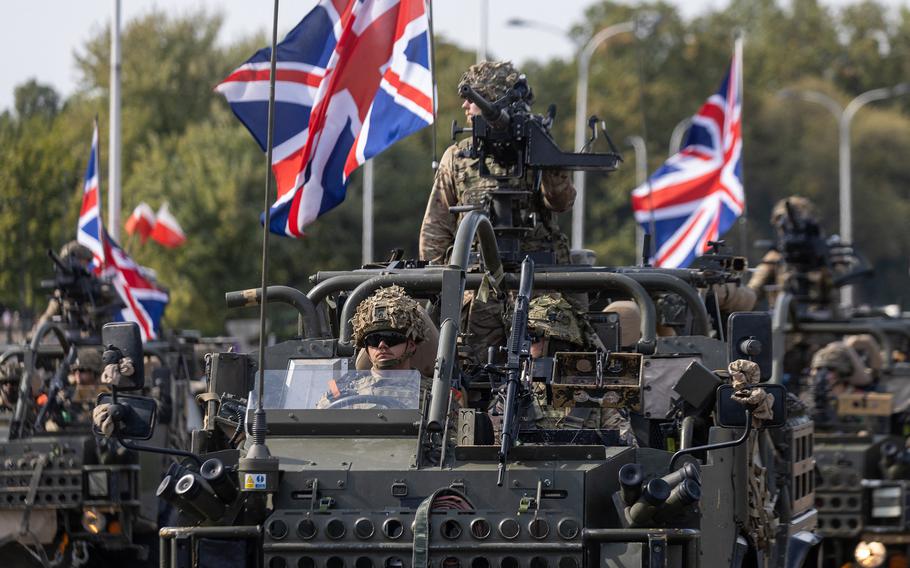
British soldiers take part in a military parade in Warsaw on Polish Army Day, Aug. 15, 2024, to commemorate the anniversary of the 1920 victory over Soviet Russia at the Battle of Warsaw. (Wojtek Radwanski, AFP via Getty Images/TNS)
(Tribune News Service) — The U.S. has asked European nations to spell out what security guarantees they’re willing to provide Ukraine to ensure a lasting peace settlement and how allies should react if any troops they deploy were attacked by Russia.
The Trump administration is seeking details on how European allies could contribute to guarantees for Kyiv and deter Moscow in future, according to documents seen by Bloomberg News.
The U.S. also wants to know how willing its European allies are to provide troops as part of any peace settlement, what U.S. support they believe is required to enable it and what they can do now to strengthen Kyiv’s negotiating position.
President Donald Trump’s special envoy for Ukraine and Russia, retired general Keith Kellogg, is expected to discuss these issues as he meets European officials this month, according to European diplomats who spoke on condition of anonymity to discuss private deliberations. Kellogg is seeking input from allies before presenting options to the president, Bloomberg News previously reported.
The U.S. government did not immediately respond to a request for comment.
The discussions come after E.U. leaders were left shocked by Trump’s push to begin talks with his Russian counterpart Vladimir Putin. U.S. and Russian officials are due to meet in Saudi Arabia this week.
With the U.S. intent on moving so fast, Europe risks being sidelined from negotiations that could ultimately determine the security balance on the continent for years to come if it doesn’t quickly come up with a tangible plan.
A group of European leaders will meet in Paris later on Monday to start drawing up their response after U.S. officials at the Munich Security Conference last week said in stark terms that there’s a limit to how much the U.S. is prepared to do.
Annalena Baerbock, Germany’s foreign minister, has suggested that Europe’s response could include a major new defense package. “We will launch a large package that has never been seen in this dimension before,” Baerbock said in an interview on the sidelines of the Munich gathering.
U.K. Prime Minister Keir Starmer meanwhile pledged in an opinion piece for Monday’s Telegraph newspaper to send British peacekeeping troops to Ukraine if needed as part of any peace settlement.
Speaking before his flight to Paris, Poland’s Prime Minister Donald Tusk told reporters he’s going to urge European leaders to get serious on boosting their defense capabilities.
“It is worth listening to, and not getting offended by the statements of the American allies, indicating the need to increase defense spending,” Tusk said. “We will not be able to help Ukraine if we do not balance Russia’s military potential.”
At the same time, he repeated that Poland won’t send its own troops to Ukraine as part of any future peacekeeping force, but would offer logistical support to nations which choose to.
In order to increase pressure on Putin, the Trump administration has asked allies what additional equipment they can send Ukraine and what steps they can take to better enforce existing sanctions and target entities in third countries that are helping Russia.
The U.S. also wants to know whether the EU is able to provide Ukraine access to more of the bloc’s single market as it moves toward membership.
The Financial Times first reported the existence of a questionnaire that touched on some of these issues.
With assistance from Jenny Leonard, Arne Delfs and Piotr Skolimowski.
©2025 Bloomberg L.P.
Visit bloomberg.com.
Distributed by Tribune Content Agency, LLC.